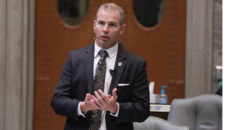JEFFERSON CITY, Mo. – In 2017, Republicans strongly questioned the effectiveness of the Missouri nonpartisan court plan while the Appellate Judicial Commission sought to fill the vacancy left by the late Judge Richard Teitelman.
Republicans argue that the Missouri Plan, as it is called, gives trial lawyers too much control over the appointment process of the same judges they would be arguing their cases before.
Their opposition of the nonpartisan court plan marks yet another instance of how legislatures have been looking to rein in the judiciary, through numerous measures of reform. A recent survey, funded by the National Science Foundation, found that during the years of 2008 and 2016, more roughly 1,700 “court-curbing” bills had been introduced throughout states. The measures dealt with things such as rules for recusal of judges, campaign contributions, judge appointment, and legislative overrides for court decisions.
Breaking down the Court Plan
The Missouri Plan, first adopted in 1940, works by putting the power into the hands of a nonpartisan panel. The panel is composed of three lawyer members from each of the three regions across the state, elected by the Missouri Bar, and three members selected by the governor. All six serve for one six-year term. The current chair of the Supreme Court chairs the commission. That commission then interviews potential candidates, determining their merits and faults as a judge, and selects the three most qualified to the Governor for consideration. The Governor then selects from that group, and after a year in office, voters get the chance to confirm the judge. If, however, the Governor should not select from the group within 60 days, the commission makes the pick.
The plan has served as a model for more than half of the state, and 22 states use the method or a variant of the Plan for the selection of their state Supreme Court judges.
The opposition
Gov. Eric Greitens has been opposed to the current system, with his policy director saying that he favored the idea of Missouri moving away to a different model before his election in November 2016. Republicans have criticized the plan as what they call a sort of liberal shifting of the state’s judges, noting that most candidates seem to either be Democratic or affiliated with them. In short, they believe that the “non-partisan” designation does not fit.
Republican political consultant James Harris of the J. Harris Company has also been a vocal opponent of the Missouri Plan.
Harris says that the Missouri Plan’s original intent was to help get politics out of the selection process, but now, it simply puts politics out of reach of the public. He says that the plaintiffs’ attorneys have gamed the system to get the judges they want, representing a small portion of Missourians instead of judges for the more than six million citizens of the state.
Harris says that over the past two decades, only three nominees have been “verifiable Republicans” and says that every panel between 2002 and 2012 included at least one former member of the Board of Governors of the Missouri Association of Trial Attorneys, who have been staunch opponents of so-called tort reform laws that have been pushed by Republicans in recent years in an effort to create a “more friendly business climate.”
“Everyone wants access to fair and impartial judges,” Harris said. “The problem is we don’t have that today.”
In support
While opposition to the plan may get more discussion these days than support in the State Capitol, one would be hard-pressed to find a judge in support of changing the Missouri Plan. And the interesting thing to note is among lawyers, support for the Missouri Plan comes from both plaintiffs and defense attorneys, from both sides of the respective courtrooms.
“I think the plan is one of the best in the country. It serves its purpose of keeping politics out of the courts for which it is applied,” Steve Gorny, MATA’s president-elect, said.“How often is it that MATA and MODL get together in support or opposition of the same piece of legislation?”
Both the Missouri Association of Trial Attorneys and the Missouri Organization of Defense Lawyers both testified, together, against Hegeman’s bill when it was brought up in committee earlier this session.
“The Plaintiffs’ Bar doesn’t want this, the Defense Bar doesn’t want this, the judges don’t want any changes to the plan, and if you ask your constituents whether they want more politics in the court, they’re all going to tell you no,” Gorny said.
“What we see is, from time to time, when there is a party that has a majority, they want to tweak what is a non-biased system in such a way to give those in power a greater opportunity to stack the courts the way they want,” Gorny concluded. “Look at the vote the last time it was put on the ballot and the overwhelming support for the plan.”
Where is the legislation this year?
While the question was one of much discussion in the previous legislative session, most likely due to the ongoing searches, there has been very little discussion during the current year.
Currently, there is only one piece of legislation in the General Assembly that deals with the bill: Sen. Dan Hegeman’s SJR 28.
That resolution proposes that a constitutional amendment should be put before Missouri voters proposing that when a judicial vacancy occurs in a court under the nonpartisan court plan, the governor shall appoint the new judge from a list of names of all qualified applicants instead of only three names. There would be no limit as to how many names would be submitted, but a minimum of three would be required.
But that begs the question: has this issue become less of a priority this year?
Harris says he suspects that it’s not an issue of less importance, but rather that the legislature feels there are larger priorities to deal with first.
The Senate Majority Floor Leader, Sen. Mike Kehoe, echoed that sentiment but noted that the issue always becomes more prevalent when the Plan is actually being put to use.
“It’s one of those issues that ebbs and flows based on judges’ appointments and everything,” Kehoe said. “I don’t think it’s gone away.”
Other options?
Harris says a better plan would be to have something more like that of the federal plan, where an executive chooses judges and then they are held accountable for those judges’ actions, or to simply allow people to vote on judges. Kehoe, meanwhile, acknowledges that he believes the Missouri Plan could use some tweaking, though he says he is not looking to throw it out.
“I don’t think I would be in favor of throwing the whole thing out,” Kehoe said. “And I know that Missouri is highly recognized for this plan, I hear that all of the time from various people. But, I still think there’s some room to fine tune that plan.”
He said that he would like to see some checks and balances in the building, particularly seeing advice and consent of the Senate being added to the process.
In North Carolina, changing the appointments process was the subject of a special legislative session, with four different plans put forward.
The Blue Plan would be based loosely on the federal model, with the Governor nominating a candidate and the House and Senate approving with a majority vote.
The Orange Plan is based on the Missouri Plan, with a 15-member commission selecting two candidates for the Governor to choose from.
The Red Plan would allow the General Assembly to appoint a candidate from those nominated by the people.
The Purple Plan is the most complicated, taking pieces from the other plans. It lets the people nominate candidates, who would then be put before a commission who would the send all qualified candidates to the General Assembly, who would then send at least three to the Governor to choose from.
So what’s next?
Will Hegeman’s resolution move forward? That remains to be seen, especially since the resolution lies in the state’s upper chamber, but Kehoe said that the resolution will be getting some time on the Senate floor during the current legislative session.
Kehoe also noted that the current Senate structure only has two lawyers as members, and says that typically is where that informative conversation comes from on the floor.
As to whether it’s a partisan issue, Kehoe says that he knows members of both parties that oppose changing the Missouri Plan, as well as members of both parties who do support changing it.
“I don’t know a whole lot of people who say we should throw it out and start from scratch,” he said.
He hopes that even if the bill does not pass or come up this year, that both sides can sit down and discuss whether there is any work that might be done to compromise or improve the Missouri Plan.















